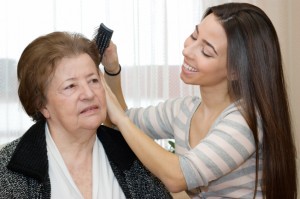Small businesses are at the core of America’s economy, accounting for the vast majority of new jobs and sales. Yet the market is a volatile; new businesses are always at risk of failure, it’s the hard truth of business. However, in recent studies that track small business success (and failure), franchises frequently performed well, much owed to how franchises come with resource materials and other benefit typical start-ups do not have access to. For entrepreneurs seeking an entry into the senior care business, franchising is an exciting opportunity.
The State of Small Business
Small businesses provide entrepreneurs with a chance to take control of their career and economic destinies. For many of us, we’ve simply been born to be entrepreneurs, taking joy in the hardships of new business and in watching it flourish.
There are more than 28 million small businesses in the U.S. The vast majority of them —an estimated 22 million— are one-person operations with no other employees.
The remaining six million are the linchpin of the U.S. economy, as more than half the U.S. workforce is employed by a small business.
While there is great opportunity in small business entrepreneurship, there is also great risk. About seven of 10 small businesses that employ workers survive their first year, but only half make it for three years. After 10 years, only a third remain in business.
Owning a franchise helps better the odds that your business will succeed. The franchise company you buy into will have done much of the trial and error for your business at other sites, allowing you to benefit from their established—and successful—business model. Instead of spending years building up a reputation for your business, you can trade on the goodwill generated by your franchise’s brand. Franchise companies also typically offer their franchisees help with finding a location, construction, training and other needs. Members of a franchise company also often get breaks on materials the company buys in bulk.
What To Expect In The First 90 Days
When you open a senior care business franchise, there are some things you’ll need to do in the first 90 days to ensure your company’s success. These include:
- Finding your first customers. Whether you’re starting a fast food joint or working with Always Best Care to provide senior care for families, you have to have to find and establish loyal consumers. Before launching your business, identify who your customers are likely to be and target them with your marketing efforts.
- Honing your selling skills. Once your business gets started, it’s time to master closing the deal. Work on your selling skills and find out what works and what doesn’t. For franchise members, much of this may be provided to you, and with access to other franchisees, you can find from their experience what has and has not worked.
- Take advantage of programs offered by your franchise. If they’re offering training, take it. If they provide accesses to financial, customer service or other advice, listen. Your franchise company is invested in seeing you succeed. Use the tools they provide you to prosper. As an entrepreneur, you have to wear the shoes of every role at your business; the greater your understanding of each role, the better you can hire in the future and better you’ll be able to manage those roles on the fly.
- Start hitting financial goals. Before you bought your franchise, you should have created some financial goals for your business as part of your business plan. When your franchise is up and running, keep a close eye on revenue and expenses and start finding ways to help meet financial goals.
- Re-evaluate pricing. Within 90 days of opening, look at your business’ pricing for services and goods and determine whether you need to lower prices to attract more business or increase them to earn more profit. As your business progresses, you’ll get a better insight into whether the prices you set at the beginning are an accurate reflection of the market.
- Work With Your Franchise. Your franchise company has a big stake in wanting you to succeed. Failed franchises reflect poorly on franchise companies. Listen to your franchise company’s advice and take advantage of any programs they have to give you access to inexpensive supplies or services.
Why Senior Care Franchises?
Senior care provides an excellent opportunity for a small business franchise. There is a rising demand for elder care in America, fueled by a growing elderly population. Over the next few years, people over the age of 65 will account for about one-fifth of the U.S. population. This demographic will require health and personal care services, and as their numbers grow, the demand for these services will too.
This demand allows easy entry into the field reduces the cost of starting an in-home care franchise. With the support of a strong senior care franchise company, entrepreneurs can quickly be on their way to a lucrative career in providing quality in-home care services to older Americans.
Franchise with Always Best Care provides an easy way for entrepreneurs to enter the lucrative and rewarding field of working in the senior care business. Always Best Care provides critical advice and training to new franchisees and connects them with invaluable resources to help them get their new business on solid footing from the start.
If you’re ready to make a difference in your community, download our FREE franchising eBook today to learn why Always Best Care’s training, marketing, and support have grown our franchisee revenue so dramatically.
Please refer to our most recent Franchise Disclosure Document for important details.


























